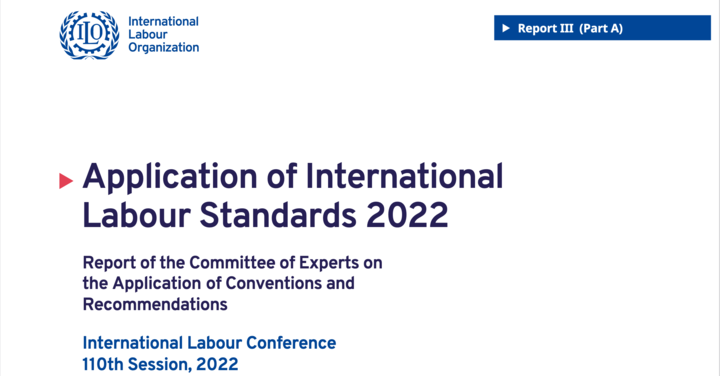What are ILO International Labour Standards?
ILO International Labour Standards (ILS) are legal instruments, drawn up by the ILO constituents (governments, employers and workers), that set out basic principles and rights at work. They are either Conventions, which are legally-binding international treaties that may be ratified by ILO Member States, or Recommendations, which serve as non-binding guidelines. In many cases, a Convention lays down the basic principles to be implemented by ratifying countries, while a related Recommendation can also be autonomous (not linked to any Convention).
ILS are adopted at the International Labour Conference (ILC) and Member States are required to submit them to their competent authority (normally the parliament) for consideration. In the case of Conventions, this means consideration for ratification. Ratifying countries commit to applying the Convention in national law and practice and to reporting its application at regular intervals to the ILO regular supervisory system. Representation and complaint procedures can be initiated against countries for violations of a Convention they have ratified.
By the end of June 2018, the ILO had adopted 189 Conventions, 205 Recommendations and 6 Protocols covering a broad range of work issues. Areas covered by ILS include: basic human rights, occupational safety and health, wages, working time, employment policy and promotion, vocational guidance and training, skills development, specific categories of workers, labour administration and inspection, maternity protection and social security, indigenous and tribal people, and migrant workers.
The ILO Governing Body has identified the following eight Conventions as “fundamental”, covering subjects that are considered as fundamental principles and rights at work: Freedom of Association and Protection of the Right to Organise Convention, 1948 (No. 87); Right to Organise and Collective Bargaining Convention, 1949 (No. 98); Forced Labour Convention, 1930 (No. 29); Abolition of Forced Labour Convention, 1957 (No. 105); Minimum Age Convention, 1973 (No. 138); Worst Forms of Child Labour Convention, 1999 (No. 182); Equal Remuneration Convention, 1951 (No. 100); and Discrimination (Employment and Occupation) Convention, 1958 (No. 111).
The principles of these Conventions are also covered in the ILO Declaration on Fundamental Principles and Rights at Work (1998). In 1995, the ILO launched a campaign to achieve universal ratification of these fundamental Conventions.
Why are ILS relevant to business?
ILS are addressed to governments. Nevertheless, they are also relevant to business in the following ways:
- Business is affected by ILS through national legislation. When a country ratifies a Convention, this instrument sets the framework for national law and practice on a certain subject. If existing national law or practice does not comply with the Convention, new labour laws, amendments of existing laws, or new implementation directives may result. As a consequence, business may be required to change its labour practices, which can involve significant administrative measures and costs.
- Even if ILS are not taken up by national law, the contents of collective agreements may be inspired by them.
- ILS can be a relevant source of practical guidance for business in areas not covered by national law or collective agreements. Many companies operating internationally have considered ILS, or the 1998 ILO Declaration, in developing their codes of conduct or other responsible business conduct initiatives. Global initiatives for voluntary business engagement, such as the UN Global Compact, draw on these sources in their labour principles and the Global Compact business stakeholders engage to work towards their realisation in their business strategies and day-to-day operations. International Framework Agreements (IFAs) negotiated between Global Union Federations (GUFs) and multinational enterprises usually make specific references to the ILO’s fundamental Conventions.
Given the above, employers must play a key role in the ILO and at national level in formulating, implementing and supervising ILS, and in ensuring that due account is taken of the business perspective, including the needs of enterprises of all sizes operating in different geographical areas, economic sectors and social frameworks. Together with governments and workers, employers are responsible for making ILS and their implementation balanced, realistic and meaningful.
What is IOE’s position on ILS?
ILS are not the answer to every problem in the workplace and should only be used to address fundamental labour issues where they can have a high impact. ILS should only be adopted where unchanging principles are involved and where there is broad consensus among the ILO constituents that regulation at international level is necessary.
In IOE’s view, ILS will lead to social and economic benefits only when they:
- Concentrate on setting worldwide relevant minimum rules, rather than seeking international harmonisation at an ideal level;
- Provide realistic and practicable orientation to countries which lack experience in labour standards;
- Are flexible enough to accommodate differences of development levels and changing needs, in particular, in the context of the Future of Work debate;
- Are based on a thorough assessment of their likely impact.
The beneficial effects of ILS depend to a large extent on a balanced application and the reasonable exercise of rights contained in them. The exercise of these rights has to respect the social and economic environment, the common good and the higher rights of other individuals and groups. In particular, the competitive needs of enterprises must receive adequate attention in the implementation of ILS since enterprises are the source of employment and, thus, the very place for the application of ILS.
How does IOE’s work on ILS impact business?
Serving our membership of more than 150 national business organisations around the world, through the Employers’ Group at the ILO inter alia, IOE:
- Solicits the views of business on topics to be considered – and, importantly, set aside – for standard-setting activity.
- Prepares, advises and guides the Group in subsequent discussions involving governments and workers to ensure that business perspectives are reflected in debates, outcomes and follow-up undertaken by the ILO Office.
- Accompanies and guides the Group, once the need for a Convention and/or Recommendation is established, in drafting the instrument, with the goal of ensuring business viability, should the instrument be adopted.
- Equips business organisations at national level when adoption takes place to be in an informed position vis-à-vis ratification and implementation, including by providing perspectives on the legal, social and economic implications of ratification, and setting out the implications for business and private sector employment creation. Employers’ organisations will also, therefore, be able to advise their own members of the implications for business operations.
- Prepares, advises and guides the employers in the ILO Standards Review Mechanism to ensure the ILO has a body of ILS that is up to date and relevant to the world of work and that takes into account the need of sustainable business.
- Encourages and advises members to provide input to the ILO supervisory bodies on the application in law and practice of ratified Conventions so that the perspectives of national employers are duly taken into account in the assessment of compliance.
No upcoming events currently scheduled...










